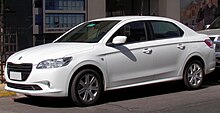Peugeot 301 (2012)
| Peugeot 301 | |
|---|---|
 |
|
 |
|
| Overview | |
| Manufacturer | Peugeot |
| Also called | Citroën C-Elysée |
| Production | 2012–present |
| Assembly | Wuhan, China Vigo, Spain , Nigeria |
| Body and chassis | |
| Class | Compact car (C) |
| Body style | 4-door saloon |
| Layout | Front-engine, front-wheel-drive layout |
| Platform | PSA PF1 platform |
| Related |
Peugeot 207 Peugeot 208 Citroën C3 (2009) Citroën DS3 |
| Powertrain | |
| Transmission | 5-speed manual 4-speed automatic 6-speed automatic |
| Dimensions | |
| Wheelbase | 2,655 mm (104.5 in) |
| Length | 4,442 mm (174.9 in) |
| Width | 1,748 mm (68.8 in) |
| Height | 1,446 mm (56.9 in) |
| Kerb weight | 1,055–1,165 kg (2,326–2,568 lb) |
The Peugeot 301 is a compact car, produced by the French automaker Peugeot. It was announced to the public in May 2012, with an official launch that took place at the Paris Motor Show in September. The 301 is built at Peugeot’s Vigo plant in Spain, alongside its twin Citroën C-Elysée, and has been manufactured in China since November 2013, and Nigeria since 2014.
Sales of the 301 commenced in November 2012, initially in Turkey, and later in other markets in Western Asia, (Taiwan Since 2016), Africa, Latinamerica and Eastern Europe. As the 301 is designed specifically for emerging markets, the 301 is not available in Western Europe, including France and the United Kingdom (similar situation in Ireland, as well as most RHD markets).
The 301 is 4,440 mm (174.8 in) in length, with a 2,650 mm (104.3 in) wheelbase.
It is powered by a range of three engines: a three-cylinder 1.2-litre VTi petrol engine shared with the Peugeot 208, producing 72 bhp (54 kW; 73 PS) and available with a manual or automated manual gearbox; a 1.6 VTi petrol with 115 bhp (86 kW; 117 PS). and a 1.6 HDi diesel with 92 bhp (69 kW; 93 PS) mated only to a manual gearbox.
The model's 301 name was first used on a 1932 Peugeot 301, and the new 301 is the first Peugeot to start the revised naming strategy of using x01 and x08 to denote emerging market models and traditional market models.
A similar model to the 301, badged as a Citroën C-Elysée, was also launched at the Paris Motor Show in 2012, with sales targeted in the first instance in eastern Europe and North Africa. The C-Elysée is also sold in Spain, Portugal, Greece, and since March 2016 also in Italy, Germany and France, three of Europe's largest car markets. From 2014, it is anticipated that the C-Elysée will be produced in China, as a successor to the current Chinese market Citroën Elysée, by the joint venture company Dongfeng Peugeot-Citroën Automobile.
...
Wikipedia
